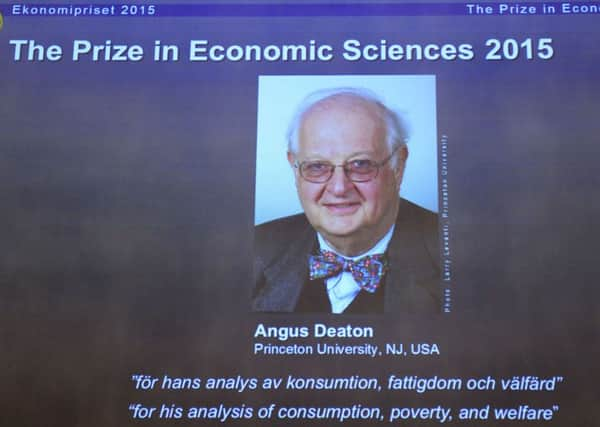Scot Angus Deaton wins Nobel prize in economic sciences


Prof Deaton, who was born in Edinburgh in 1945, now works at Princeton University in the United States.
The academy said the work for which he has been honoured revolves around three central questions: how do consumers distribute their spending among different goods; how much of society’s income is spent and how much is saved; and how do we best measure and analyse welfare and poverty?
Advertisement
Hide AdAdvertisement
Hide AdProf Deaton said he found out about the award in an early-morning phone call from the Nobel committee.
“If you’re my age, and you’ve been working for a long time, you know this is a possibility,” he said. “But you also know there are a huge number of people out there who deserve this.
“That lightning would strike me seemed like a very small-probability event. It was sort of like, ‘Oh my goodness, it’s really happening’.” He described himself as “someone who’s concerned with the poor of the world and how people behave, and what gives them a good life”.
Prof Deaton has lived in the the US for many years but holds both British and US citizenship. Asked whether he felt like a Scot, an American or a combination, he replied: “All of them. All of the above.
“I was very glad that, in the end, the [2014] referendum did not make me forced to choose between being British and Scottish. I feel very Scottish. My father was born in England, my mother was born in Scotland.
“And as I think someone else said in England at the time, I would feel like I was being personally dismembered. I like the idea of England and Scotland being part of Britain.”
Ingvild Almas, of the Norwegian School of Economics, said the Indian government has changed its methodology for measuring poverty thanks to his research.
“Deaton found that there were a lot more poor people in rural areas of India than previously thought,” she said. “That has affected India’s subsidy system for the poor, which allows them to buy necessities.”
Advertisement
Hide AdAdvertisement
Hide AdFans on Twitter were quick to applaud his talents. “Angus Deaton is the Obi-Wan Kenobi of Economics,” wrote Amitabh Chandra of Harvard University. “Breathtaking range of work in poverty, health, healthcare, wellbeing, methods.”
Last year, French economist Jean Tirole won the eight million Swedish kronor (£637,000) award for his research on market power and regulation.
The announcement concludes this year’s presentations of Nobel winners. The medicine prize went to scientists from Japan, the US and China who discovered drugs to fight malaria and other tropical diseases. Japanese and Canadian scientists won the physics prize for discovering that tiny particles called neutrinos have mass and scientists from Sweden, the US and Turkey won the chemistry prize. Belarusian investigative journalist Svetlana Alexievich won the literature award, while the peace prize went to the National Dialogue Quartet in Tunisia for its contribution to democracy in the country following the 2011 Jasmine Revolution.